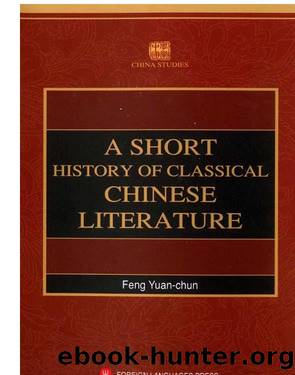ä¸å½å¤å ¸æå¦ç®å²ï¼è±æ by 冯沅君

Author:冯沅君
Language: eng
Format: epub
Publisher: 外文出版社
Published: 2009-08-15T00:00:00+00:00
4.Southern Sung and Golden Tartar Period
The fall of the Northern Sung dynasty shook all writers of the time out of their complacency and resulted in an increased variety of subject matter in Southern Sung literature. Few masterpieces were produced in this period, but important advances were made in fiction and drama, and the foundations were laid to a great extent for the best Yuan, Ming and even Ching writing. From this time onwards fiction and drama occupied increasingly important positions in Chinese literature while poetry and essays took second place.
The patriotic standard-bearers of Southern Sung literature were the great writers Lu Yu and Hsin Chi-chi.
Lu Yu (1125-1210) was a native of Shanying in present-day Chekiang. From his boyhood north China's defeat rankled in his heart, and all his life he longed for the recovery of the lost territory. After he became an official he spent ten years in Szechuan, where all the commanders were staunch patriots, and these men encouraged him and influenced his work.
His poems are filled with fervent patriotism. Sometimes he brooded bitterly over China's losses and lashed out at the government for surrendering. He greeted the rare victories with passionate enthusiasm, and even dreamed of the recovery of the north.Thus he wrote:
Towards midnight on the eleventh of the fifth month I dreamed that I accompanied His Majesty on an expedition to reconquer all the territory of the Han and Tang empires. I saw a rich, populous city, and was told this was Hsiliang. In raptures, I wrote a poem in the saddle, but woke before it was finished.Now I am completing it.
A million warriors follow the Son of Heaven; Before his command goes out our land is retaken. New cities rise at distant frontier stations, And travelling in state The emperor proclaims a general amnesty.
Many of his poems reflect his indomitable spirit, but unfortunately he died without seeing China restored to her former splendour. Thus he left his son the heartfelt injunction:
Though I know when a man is dead that is the end, My one grief is not to have seen this land united. As soon as our kingly army recovers the north, Be sure to tell your old man when you sacrifice![10]
Lu Yu's tzu express the same passion.Thus he wrote:
Now, my hair fiecked with white, I am shocked to find my ambitions come to nothing And my life that of a wanderer. A jaded thoroughbred, Little by little I have lost my mettle; Far, far away, behind folds of mist and water, I dream of the mountains and streams of my native land.
As an ardent patriot, Lu Yu loved the labourers whose toil supported the country. In his works he prays for good harvests, sighs over the devastation of so many cities, inveighs against the disparity between the rich and the poor, attacks the decadence of the rulers, and shows remarkable respect for the common people's opinions. He was not only with them in spirit, but lived very much as they did, cultivating his land himself.
In midspring a farmer tills his fields
And tends his mulberry trees.
Download
This site does not store any files on its server. We only index and link to content provided by other sites. Please contact the content providers to delete copyright contents if any and email us, we'll remove relevant links or contents immediately.
A Friend in the Dark by Pascal Ruter(215)
The Art of SEO by Eric Enge Stephan Spencer and Jessie Stricchiola(202)
Digital Infrared Photography Photo Workshop by Sandidge Deborah(196)
Man-Machine-Environment System Engineering by Unknown(193)
Different-Worlds-18 by Unknown(187)
The Pyramid Mind by Vlad Beliavsky(176)
Encyclopedia Of Mathematics (2005) by Unknown(169)
Brave by Wendy Constance(162)
The Three Rs and the Humanity Criterion by Michael Balls(152)
å¯åå °å²å¦æéï¼è±æ by 冯友兰(144)
Pirates, Prisoners, and Lepers: Lessons from Life Outside the Law by Paul H. Robinson & Sarah M. Robinson(144)
To Me, The One Who Loved You by Yomoji Otono(137)
Command-Line by Unknown(137)
Randolph Caldecott--The Man Who Could Not Stop Drawing by Leonard S. Marcus(129)
Fairy Tales for the Disillusioned by Gretchen Schultz(128)
SAYE by Wu Zhe(127)
Minimally Invasive Orthopaedic Trauma by Gardner Michael J.;Siegel Jodi;(124)
Computational Geometry by Unknown(124)
Copyright by Peter Qin(121)
